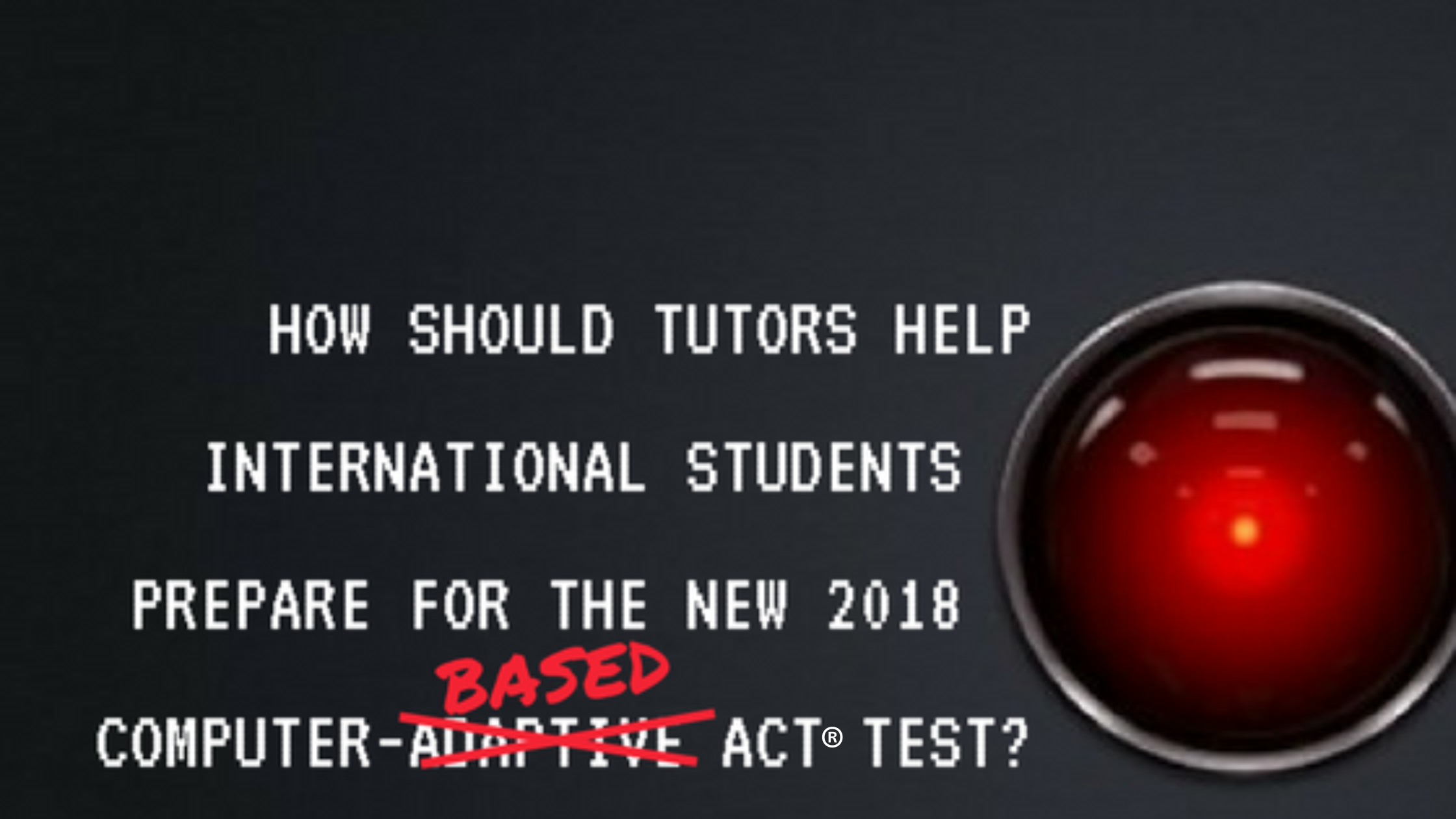How Should Tutors Help Students Prepare for the New 2018 Computer-Based ACT® Test?
Updated on June 12, 2023
You may have heard that ACT® plans to administer a computer-adaptive version of the ACT® test starting in the Fall of 2018. It's not true.
ACT® has no plans to administer a computer-adaptive ACT® in 2018, and no firm date to roll one out anytime in the near future.
In this post, we attempt to uncover how so many students, parents, tutors, and even teachers came to believe that ACT® plans to offer a computer-adaptive test for the Fall of 2018.
Is ACT® a Victim of #FakeNews?
That depends on what you mean by "Fake News." Properly understood, the term "Fake News" implies that the person or institution who crafted the story did so with the deliberate intention of deceiving people.
In the case of the ACT®, however, reports of the ACT's® switch to a computer-adaptive test are the result of a combination of outdated press releases, sloppy reporting from internet bloggers, and a handful of ambiguous phrases scattered across articles in major US newspapers.
ACT's® July 2016 Press Release
In a press release from July of 2016, ACT® announced that it was working hard to ready the computer-adaptive version of the ACT® test that would be administered internationally, starting in 2017.
You read that correctly. The initial press release (which is still posted on ACT's® website!!) claimed that the computer-adaptive-test (CAT) version of the ACT® would be administered to international students starting in the Fall of 2017. Obviously, that hasn't happened.
Why the Rumor of a Computer-Adaptive ACT® Persists
This misconception draws its strength from zombie blog posts. These are content-marketing pieces that have joined forces to form an army of the undead. They're characterized by the fact that they report the 2016 press release in the present tense without any updated information.
Here's an example I accessed literally today:
That's not ideal. But I actually think the next article is way worse. See if you can spot the problem in the blog post below.
This article notes that ACT's® 2016 press release is out-of-date, but the author still manages to convey misinformation by seamlessly transitioning from its discussion of computer-adaptive testing (CAT) to computer-based testing.
In doing so, the author unintentionally misleads readers by citing the 2018 implementation date for ACT's® computer-based testing.
What's The Difference Between Computer-Based Testing and Computer-Adaptive Testing?
Computer-Based Testing is a phrase that describes a test that displays questions on a computer screen, and requires the student to submit answers via an on-screen answer sheet. A computer-based test is NOT necessarily a computer-adaptive test. And in the case of the ACT's® 2018 roll-out of computer-based testing, the test is 100% identical to the ACT ®test that students will take on paper. Each question and its location on the test is predetermined. The test will NOT adapt or change in any way as you complete test questions.
Computer-Adaptive Testing (CAT) is a form of computer-based testing that adapts to the test taker's ability level. For this reason, it has also been called “tailored testing.” In other words, it is a computer-administered test in which the next item or set of items selected to be administered depends on the correctness of the test taker's responses to the most recent items administered.
The Larger Lesson: Quality Journalism Matters
In a recent New York Times article written by Liz Moore, the topic is thoughtfully examined in a Q&A format. As a result, the article succeeds on all fronts. It defines key terms, explains the recent historical context, cites sources, and alludes to the controversy that will inevitably result from the change to computer-based testing.
Moore's article is written, edited, and fact-checked by professionals. It's not content marketing. It's a news article. And it turns out that makes a big difference. To get a sense of how big a difference that can make, let's take a quick look at an interesting chapter in American history known as The Great Disappointment.
The Great Disappointment
If you ever find yourself 40 miles west of Chicago, you can visit Aurora University and to the papers of William Miller, the nominally Baptist/Deist who founded Millerism and convinced somewhere between 50,000 and 500,000 Americans that he had precisely calculated the end of the world. From 1832-1834, Miller published 16 articles in the Vermont Telegraph. But according to Miller, it's unlikely that he could have transformed his "obscure, regional movement into a national campaign" without the help of Joshua Vaughan Himes, a pastor/publisher in Boston whose publication of Miller's calculations in the paper Sign of the Times brought national attention to Miller's burgeoning movement.
Unfortunately (or fortunately, depending on your point of view), the date he'd calculated, October 22nd, 1844, came and went without incident. The day came to be known as “The Great Disappointment.”
Note: I'm not totally up on Miller's orthodoxy, but it seems like a weird move calling any day the world doesn't end “The Great Disappointment.” This surely wasn't the first incident of "fake news," but it was probably a high water mark for the era.
The point I'm attempting to make is that we should celebrate the fact that Miller's papers are still on display. Today, they're preserved as fascinating artifacts a time in America during the Great Awakening and Second Great Awakening. They serve as a cautionary tale. And unlike zombie blog posts about the ACT's® computer-adaptive testing, there's virtually no danger that anyone today will mistake Himes's publications for current instructions.
Still, the scope of the delusion is breathtaking. Miller's followers may have included as much as 2.5% of the total population of the United States in 1844. Today, that same percentage would include approximately 8.15 million people who "like" and "share" information without verifying its veracity. Good thing we don't have to worry about anything like that happening again! Right??
Meanwhile, As I Type This...
At this very moment, Facebook CEO, Mark Zuckerberg, is testifying before the United States House of Representatives to address credible concerns that his social media platform empowered malicious foreign actors to weaponize the reckless sharing habits of today's true believers.
For reasons that should be obvious, I won't get into the bad actors' motivation. And anyway, it's not relevant to the central point of this post. Suffice to say, everything we've learned thus far about the "fake news" epidemic suggests that we're wholly unprepared and dangerously divided at this critical moment in American history.
According to a recent study conducted by Princeton University, Dartmouth College, and the University of Exeter, "approximately 1 in 4 Americans visited a fake news website from October 7-November 14, 2016." To put that in perspective, that's approximately 82 million Americans. This, I submit, should be known as “The Second Great Disappointment! “
To put it another way, we've become aware of a very long lever that's capable of discretely exerting an astonishing degree of leverage against the institutions we hold most dear. Now we must concede the necessity of learning as much as possible about the mechanics and physics of any lever with the capacity to—quite literally—move the world.
19th-century preacher, Thomas De Witt Talmage, paraphrased Archimedes: "The pen is the lever that moves the world."
How Can Tutors Help International Students Prepare?
Encourage your students to download TestNav to get familiar with the interface they'll use to take the online ACT®.
Contact Clear Choice Test Prep to learn more about our 100% white-label test-prep system, which includes custom-branded printed workbooks and online resources for tutors. We'll help you make sure your international students are well prepared to take the ACT® on a computer screen.
Before You "Like" and Share This Post...
If you stuck with me through this entire post, then I want to say thank you.
I also want to encourage you to join us at Clear Choice Prep by doing your part to address the epidemic of "fake news." Encourage your students to critically evaluate the news they consume and share publicly. And by all means, practice what you preach!
Lastly, I want to encourage you to support journalists by paying money for a newspaper subscription. Or, at the very least, turn off your ad-blocking software when you visit their homepages. In the end, the single, best way to stop the spread of fake news is to subscribe to real newspapers and periodicals that employ real reporters and print real facts.








